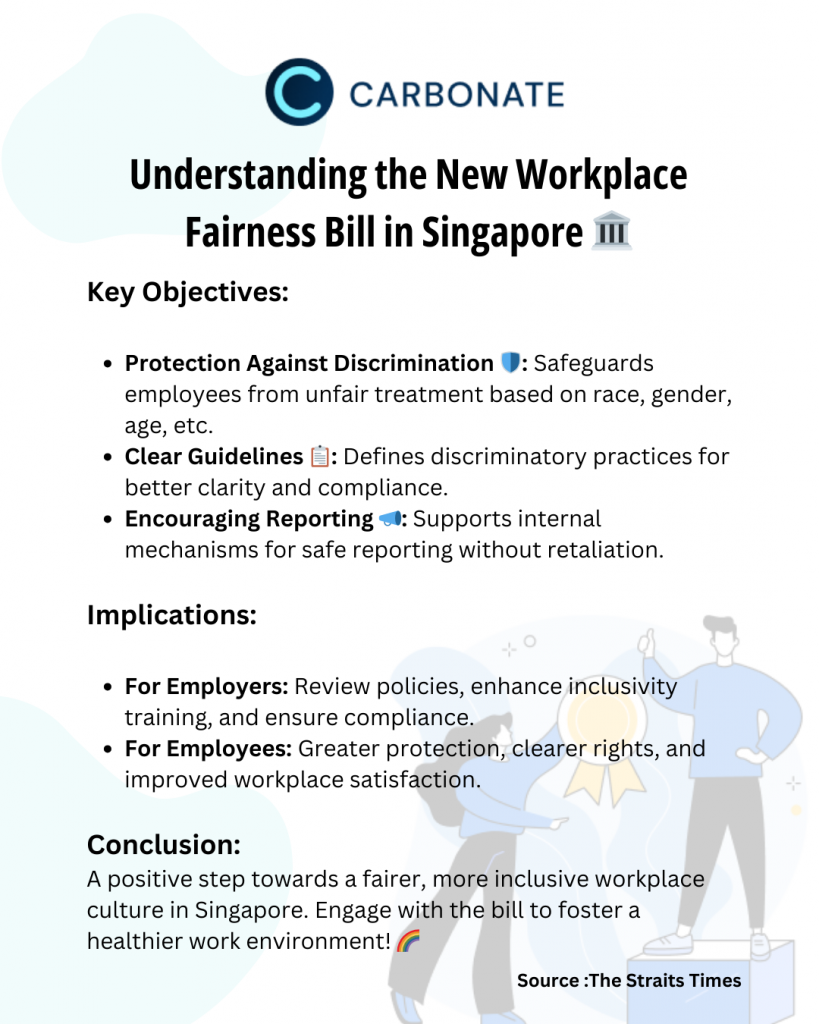Navigating Change: The Workplace Fairness Bill and Its Effects on Remote Workers from ASEAN and India
The recently proposed Workplace Fairness Bill in Singapore represents a pivotal shift in the landscape of employment rights and protections against discrimination. As the global workforce evolves, particularly with the rise of remote work, the implications of this legislation extend beyond local boundaries, affecting workers from ASEAN countries and India. This article explores the key features of the bill, its potential impact on various stakeholders, and how it addresses the needs of remote workers.
Overview of the Workplace Fairness Bill
Introduced by the Ministry of Manpower (MOM), the Workplace Fairness Bill aims to establish a comprehensive framework to protect employees from discrimination based on various characteristics, including:
-
Age
-
Nationality
-
Sex
-
Marital status
-
Pregnancy
-
Caregiving responsibilities
-
Race
-
Religion
-
Language ability
-
Disability
-
Mental health condition
The bill is structured in two phases, with the first phase focusing on establishing principles of fairness and dispute resolution processes. The second phase, expected to be introduced next year, will outline claims procedures and amend existing laws like the Employment Claims Act. If passed, the legislation is anticipated to come into effect by 2026 or 2027
Key Features of the Bill
-
Comprehensive Protection Against Discrimination: The bill prohibits employers from making adverse employment decisions based on protected characteristics. This includes hiring practices, performance reviews, promotions, and dismissals
-
Accountability for Employers: Employers who engage in discriminatory practices may face legal repercussions, including financial penalties. This aims to deter unfair treatment and promote compliance with fair employment norms
-
Support for Local Workforce: The legislation emphasizes that Singapore citizens and permanent residents should make up the core of the workforce, with foreign workers serving as a complement. Employers will be required to consider local candidates before applying for work passes for foreign hires
-
Flexibility for Genuine Business Needs: While promoting fairness, the bill allows employers to consider certain protected characteristics when necessary for specific job roles (e.g., language proficiency for interpreters)
-
Encouragement of Internal Reporting Mechanisms: The legislation encourages companies to establish internal systems for reporting discrimination without fear of retaliation, fostering a culture of transparency and accountability

Implications for Remote Workers from ASEAN Countries and India
The rise of remote work has transformed employment dynamics across borders. For remote workers from ASEAN countries and India employed by Singaporean companies, the Workplace Fairness Bill brings both opportunities and challenges:
Opportunities
-
Enhanced Protections: Remote workers will benefit from the same protections against discrimination as their local counterparts. This is crucial in ensuring that they are treated fairly regardless of their geographical location
-
Access to Legal Recourse: The bill provides mechanisms for remote workers to seek recourse if they experience discrimination. This could include filing complaints through established channels without needing to be physically present in Singapore
-
Promotion of Inclusive Practices: As companies adapt to comply with the new legislation, there may be a greater emphasis on inclusive hiring practices that value diversity across all employees, including those working remotely from other countries.
Challenges
-
Implementation Across Borders: While the bill provides protections, enforcing these rights can be complex for remote workers located outside Singapore. Issues related to jurisdiction may arise when attempting to resolve disputes or seek legal action against employers
-
Potential Exemptions for Smaller Firms: The bill exempts smaller firms (those with fewer than 25 employees) from certain provisions, which could leave some remote workers vulnerable if their employer falls into this category
-
Cultural Differences in Employment Practices: Remote workers from different cultural backgrounds may face unique challenges in adapting to Singapore's workplace norms and expectations regarding fairness and equality.
Conclusion
The proposed Workplace Fairness Bill is a significant advancement in protecting employees' rights in Singapore, particularly as it pertains to discrimination based on various characteristics. For remote workers from ASEAN countries and India, this legislation presents an opportunity for enhanced protections and inclusivity in the workplace.However, challenges remain regarding enforcement and implementation across borders. As discussions around this bill continue, it will be essential for stakeholders—employers, employees, and policymakers—to engage actively in shaping an equitable work environment that transcends geographical boundaries.In summary, as Singapore moves towards implementing this important legislation, it sets a precedent not only for local employment practices but also for how international labor standards can evolve in an increasingly interconnected world. By fostering fair treatment across all levels of employment—whether local or remote—Singapore can enhance its reputation as a progressive leader in workplace equality within the region and beyond.
